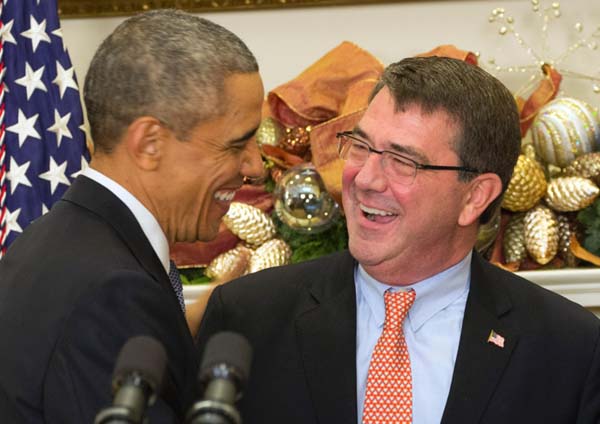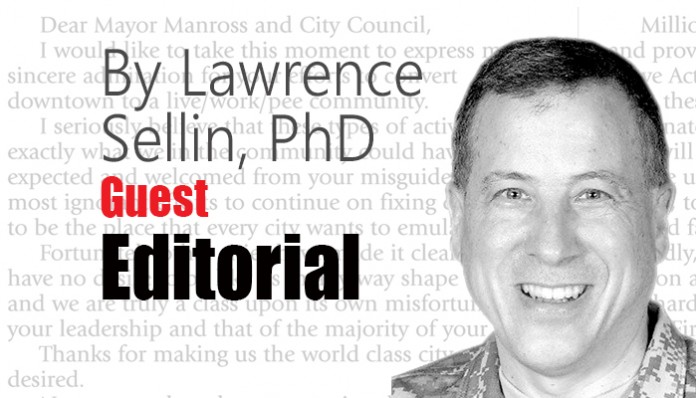
In order to quickly address urgent issues facing the military, you sometimes have to be willing to rock the boat, bend the rules and push the envelope; but more importantly, you must have the ability to identify innovative solutions and the practical means to implement them.
In my civilian career with IBM, I learned that innovation is the intersection of inspiration and invention, that is, ideas coupled with action.
As one part of his “Force of the Future” initiative, most of which I do not endorse, Secretary of Defense Ashton Carter has asked Congress for changes in existing laws to facilitate the Pentagon’s quest for talent in specialized areas such as cyber warfare, including:
– Let cyber and other technical experts join the military at higher ranks than fresh-faced second lieutenants right out of ROTC, something only doctors can do today;
– Let DoD hire talented graduates as Pentagon civilians fresh out of school, without going through the usual civil service rigmarole of USAjobs.gov;
– Let military officers take non-standard assignments, such as going to graduate school, without being penalized for it when they’re up for promotion;
– Let Carter and future secretaries waive provisions of the landmark Defense Officer Personnel Management Act (DOPMA) to address shortages in crucial skills.
Although none of these ideas is new, they all face an uphill battle against bureaucracy, tradition, and long-established statute.
The effort may have merit as long as the program is used to recruit genuine specialists and not merely provide an alternative means of employing political hacks.
Perhaps a personal anecdote might provide some comfort to Secretary Carter in his effort to upgrade the military personnel system.
When I assumed command of the US Army Reserve Medical Support Unit (MSU) in Heidelberg, Germany in June 2006, I was faced with a similar problem, albeit on a smaller scale.
The MSU was in a virtual permanent non-mobilization, non-deployable state because, among other deficiencies, the unit could never recruit enough doctors to fill its required number of allocated positions. And the prospects for even finding available American military physicians in Europe remained bleak.
The innovative solution we identified was to recruit Army Reserve physicians from the continental United States, “attaching” them to the MSU, rather than assigning them.
The key to the recruitment process, however, was offering the physicians and other medical personnel, opportunities for unique and professionally-rewarding training experiences.
That second component proved to be the most challenging aspect of the recruitment process because we were met with enormous bureaucratic resistance throughout the chain of command, which ultimately required us to rock the boat, bend the rules and push the envelope; all of which created considerable consternation within the bureaucracy, and, as the MSU commander, made me something of a pariah at the general officer level.
Nevertheless, we succeeded in attracting a wide variety of medical personnel, even a veterinarian, an expertise we found to be critical to our efforts in Africa.
Beginning from the Summer of 2006, the MSU participated in three missions to Africa (Benin, Mali and Niger), one multinational exercise in Germany (December 2007) and one joint, multinational exercise in the Republic of Georgia (Immediate Response 2008, July – August 2008). The mission to Mali in August-September 2007 was a joint (US Air Force, US Army Reserve) medical, dental and veterinarian humanitarian deployment with Special Operations Command Europe.
In addition, the MSU provided Combat Life-Saver Training throughout Europe to over 3,000 Army, Navy, Air Force and Marine personnel.
Word quickly spread that the MSU was offering meaningful real-world training opportunities and between 2006 and 2008 the unit increased its strength from 60% to over 150%, improving both its recruitment and retention, and was for the first time in its recent history fully manned and deployable.
Secretary Carter may be buoyed by our experience and what became the MSU motto – “The difficult we do immediately, the impossible takes a little longer.”
Lawrence Sellin, Ph.D. is a retired colonel with 29 years of service in the US Army Reserve and a veteran of Afghanistan and Iraq. Colonel Sellin is the author of “Restoring the Republic: Arguments for a Second American Revolution. He receives email at [email protected].





